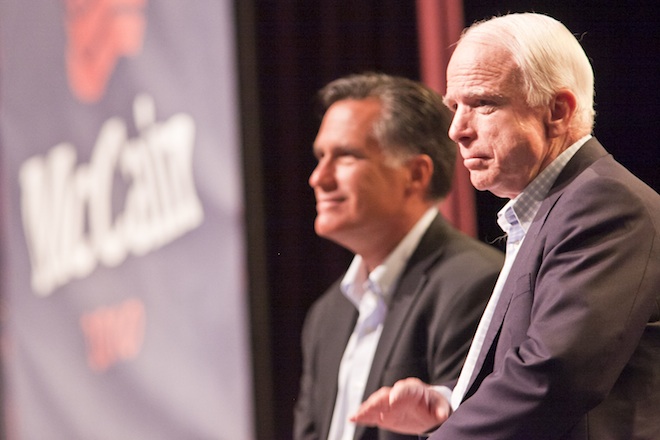John McCain may be one of Mitt Romney’s top supporters now, but the release of his 2008 opposition research file on the current frontrunner gives an uncomfortable inside look at how he once prepped himself to battle his former rival. Especially awkward is that McCain, who has suggested attacks on Romney’s record at Bain Capital are an affront against capitalism itself, dinged Romney over the same issue while his staff identified the company as a key vulnerability.
The 2008 oppo file, obtained by Buzzfeed’s Andrew Kaczynski, contains over thirty pages on Bain that reference many of the same issues raised by Newt Gingrich, Rick Perry, and national Democrats recently.
“Under Romney’s Leadership, Bain Capital Had History Of Relentless Focus On Bottom Line, Improving Corporate Profits At Expense Of Local Workers,” the heading to one subsection reads. It goes on to list various news references to layoffs at companies bought out by the private equity firm under Romney and specifically notes cases where the candidate defended job losses. Among them, AMPAD, the defunct Indiana paper plant that Democrats and Republicans alike have used against Romney since his 1994 Senate run. According to McCain’s staff, AMPAD “fired its workers, and offered to bring them back at drastically reduced salary and benefits.”
McCain himself raised the issue of Bain’s layoffs in debates and on the campaign trail, though it never became a major focus of the race.
“I think he managed companies and he bought and he sold and sometimes people lost their jobs,” McCain said in one January 2008 debate. “That’s the nature of that business.”
Of course, things change. Now McCain is going after Gingrich and Perry in the strongest terms, even suggesting that they’re promoting Soviet-style economic tyranny.
“These attacks on, quote, Bain Capital is really kind of anathema to everything that we believe in,” McCain said recently. “We believe in job creation, and the record of Bain Captial is to take companies that would otherwise fail and restore them to some kind of viability, and sometimes that doesn’t work, but, you know, when it always works is a thing called communism, where you keep everybody in business.”






